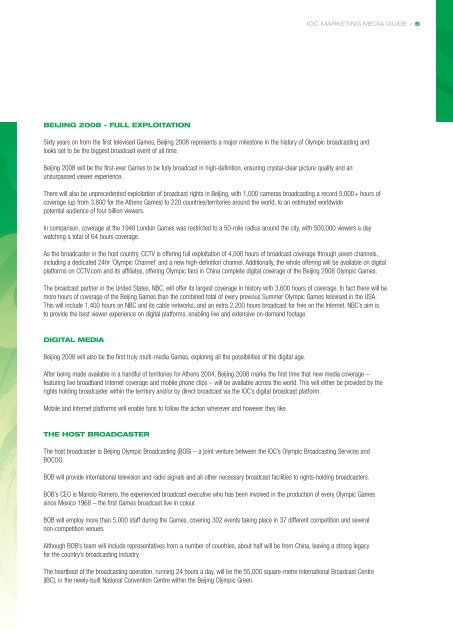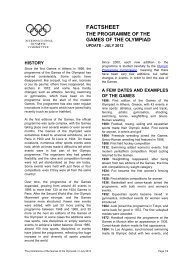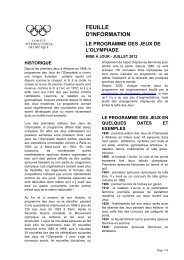You also want an ePaper? Increase the reach of your titles
YUMPU automatically turns print PDFs into web optimized ePapers that Google loves.
BEIJING 2008 - FULL EXPLOITATION<br />
Sixty years on from the first televised Games, Beijing 2008 represents a major milestone in the history of Olympic broadcasting and<br />
looks set to be the biggest broadcast event of all time.<br />
Beijing 2008 will be the first-ever Games to be fully broadcast in high-definition, ensuring crystal-clear picture quality and an<br />
unsurpassed viewer experience.<br />
There will also be unprecedented exploitation of broadcast rights in Beijing, with 1,000 cameras broadcasting a record 5,000+ hours of<br />
coverage (up from 3,800 for the Athens Games) to 220 countries/territories around the world, to an estimated worldwide<br />
potential audience of four billion viewers.<br />
In comparison, coverage at the 1948 London Games was restricted to a 50-mile radius around the city, with 500,000 viewers a day<br />
watching a total of 64 hours coverage.<br />
As the broadcaster in the host country, CCTV is offering full exploitation of 4,000 hours of broadcast coverage through seven channels,<br />
including a dedicated 24hr ‘Olympic Channel’ and a new high-definition channel. Additionally, the whole offering will be available on digital<br />
platforms on CCTV.com and its affiliates, offering Olympic fans in China complete digital coverage of the Beijing 2008 Olympic Games.<br />
The broadcast partner in the United States, NBC, will offer its largest coverage in history with 3,600 hours of coverage. In fact there will be<br />
more hours of coverage of the Beijing Games than the combined total of every previous Summer Olympic Games televised in the USA.<br />
This will include 1,400 hours on NBC and its cable networks, and an extra 2,200 hours broadcast for free on the Internet. NBC’s aim is<br />
to provide the best viewer experience on digital platforms, enabling live and extensive on-demand footage.<br />
DIGITAL MEDIA<br />
Beijing 2008 will also be the first truly multi-media Games, exploring all the possibilities of the digital age.<br />
After being made available in a handful of territories for Athens 2004, Beijing 2008 marks the first time that new media coverage –<br />
featuring live broadband Internet coverage and mobile phone clips – will be available across the world. This will either be provided by the<br />
rights holding broadcaster within the territory and/or by direct broadcast via the IOC’s digital broadcast platform.<br />
Mobile and Internet platforms will enable fans to follow the action wherever and however they like.<br />
THE HOST BROADCASTER<br />
IOC MARKETING MEDIA GUIDE / 6<br />
The host broadcaster is Beijing Olympic Broadcasting (BOB) – a joint venture between the IOC’s Olympic Broadcasting Services and<br />
BOCOG.<br />
BOB will provide international television and radio signals and all other necessary broadcast facilities to rights-holding broadcasters.<br />
BOB’s CEO is Manolo Romero, the experienced broadcast executive who has been involved in the production of every Olympic Games<br />
since Mexico 1968 – the first Games broadcast live in colour.<br />
BOB will employ more than 5,000 staff during the Games, covering 302 events taking place in 37 different competition and several<br />
non-competition venues.<br />
Although BOB’s team will include representatives from a number of countries, about half will be from China, leaving a strong legacy<br />
for the country’s broadcasting industry.<br />
The heartbeat of the broadcasting operation, running 24 hours a day, will be the 55,000 square-metre International Broadcast Centre<br />
(IBC), in the newly-built National Convention Centre within the Beijing Olympic Green.

















